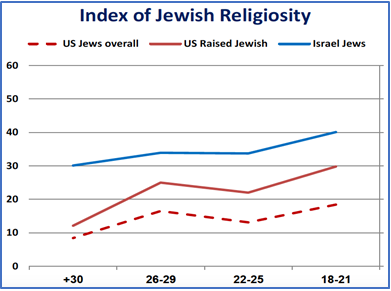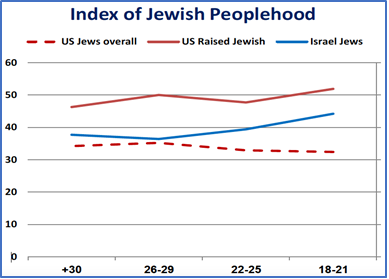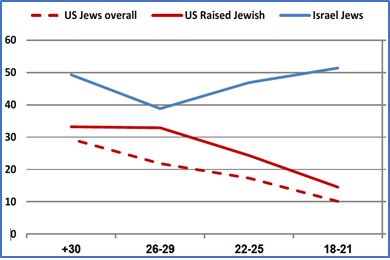 Pro-Israel supporter in New York City. (photo credit: Reuters/Carlo Allegri)
Pro-Israel supporter in New York City. (photo credit: Reuters/Carlo Allegri)
Conferences are a good way of meeting people and listening to what they have to say, often based on information that they have and you don’t. So last week, at the JPPI conference on the future of the Jewish People, I listened attentively to Prof. Sergio DellaPergola of the Hebrew University as he presented a few numbers from a paper he authored with Ariela Keisar of Trinity College. He then kindly agreed to send me the slides that the two of them presented at the conference of the Association of Jewish Studies back in December of last year.
Like many papers, it has a fancy name: Contrasts and Comparisons of American and Israeli Jews: Millennials Under Scrutiny. Like some papers, behind the name there is information. In this case, it’s information about a group that the professional Jewish world is highly concerned about: millennial Jews in Israel and America. The two studies by PEW, in America and Israel, have comparable numbers to work with. So the authors decided to compare these two groups.
They are different, of course. Beginning with the fact that some Israeli millennials are still serving in the military while their cousins in the US go to college. Continuing with the fact that most US millennials are still single (90%) while their Israeli cousins have already begun getting married (31%) and having children.
DellaPergola and Keisar have discovered a few interesting things about Jewish millennials in the two largest and most significant Jewish communities today. For example: that religiosity among Jewish millennials is on the rise – a result, no doubt, of the demographic composition of this group compared to other groups of Jews (that is, it is more heavily Orthodox). The authors looked at the percentage of Jews agreeing with three statements: Weekly attendance at religious services; Religion is important in my life; I believe in God or universal spirit.
Take a look at the graph: younger Jews in Israel are becoming more religious, and so are younger Jews in America (in which you can also see a clear difference between Jews that were and were not “raised Jewish”).

In a similar way – looking at the number of Jews who agree with three statements – DellaPergolla and Keisar examined the sense of peoplehood among younger Jews. The statements are: Being Jewish is important in my life; I have a special responsibility to take care of Jews around the world; and I have a strong sense of belonging to the Jewish people. In this case, the response is split: those raised as Jews – in Israel or America – feel more Jewish than the older generation. But the sense of peoplehood among those who weren’t raised Jewish is in decline (this should not come as huge surprise).
Take a look:

The Israel support index is based on positive responses to two statements – and in this case it is possible to make the case that maybe the questions do not reflect exactly what the authors claim (support for Israel). The statements are “Caring about Israel / Living in Israel is essential to my Jewish identity”; “the Israeli government is making sincere efforts to bring peace with Palestinians.” Clearly, the first statement is direct and reflects support or identification with Israel. But the second question is trickier: does disagreeing with the contention that a certain Israeli government is making a sincere effort to achieve peace make a person less supportive of Israel? In recent JPPI studies we asked groups of Jews the same question and found what DellaPergola and Keisar also found: that Israel’s efforts are not considered sincere by many Jews in other countries. But they show us that the lower the age, the higher the skepticism of Israel’s sincerity.
The same doubt can be raised about the index they call Jewish Nationalism and which is based on the following three questions: Settlements help Israel’s security; God gave the Land of Israel to Jews; I do not think a way can be found for Israel and an independent Palestinian state to coexist peacefully. Why do I find this index somewhat problematic? Because the first and third statements are political in nature, but the second is a cultural-theological question. In other words: the authors inadvertently assume that believing in a God-given land is connected with believing in the benefit of the settlement project. And while this assumption is probably valid in the real world – I do not think it is valid in the world of ideas.
DellaPergola and Keisar examined other questions, but sticking to politics, their last graph is the most interesting – as it paints vividly what we recognize as the growing political gap between young Israelis and young Jews in the US.
This graph uses again the “Israeli efforts for peace sincere” statement, but adds to it the mirror image statement “Palestinian efforts for peace sincere.” The index based on these two statements shows the percentage of difference between sincere Israeli and sincere Palestinian efforts, among young Israelis, young “raised Jewish” American Jews, and young American Jews (including those who weren’t raised Jewish). The result is a graph that tells the story of a growing gap. Young Israelis have much more confidence in Israel’s sincerity compared to the sincerity of the Palestinians, while US Jews don’t see as much difference between the sincerity (or lack thereof) of Israelis and Palestinians.
Here it is:

What do we learn from this? That Israel might be successful in convincing its youngsters of its narrative, but it fails to convince young American Jews that it still wants peace. If young Jews in America, as they grow older, will view Israel as a country that doesn’t pursue peace, it will surely make it more difficult for them to support it – no matter if they are correct in their conclusion or widely off the mark.























 More news and opinions than at a Shabbat dinner, right in your inbox.
More news and opinions than at a Shabbat dinner, right in your inbox.